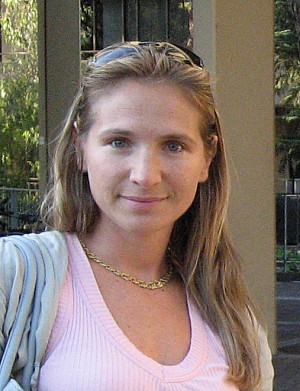Benedetta Sampoli Benitez

Title
Chair of the Division of SciencesProfessor of Chemistry and Biochemistry
Pre-Health Advisor
Department
Natural SciencesPhone
212-517-0653About
Dr. Benedetta Sampoli Benitez joined the faculty at Marymount Manhattan College in 2000. After graduating with honors in Chemistry at the University of Florence, Italy, where she is from, she went on to the University of California, San Diego, for her Ph.D. She also worked at Memorial Sloan Kettering Cancer Center as a research fellow prior to joining MMC.
Dr. Sampoli Benitez welcomes undergraduate students to work with her and she is actively involved in faculty-guided research with students on campus. Her research students have been presenting their work at regional and national research conferences, often earning top honors. She also supervises numerous internships in medical institutions of New York City such as Weill-Cornell Medical Center, Sloan Kettering Cancer Center, and Rockefeller University.
Degree(s)
B.S., summa cum laude, University of Florence
M.S., University of Florence
Ph.D., University of California, San Diego
Research
Dr. Sampoli Benitez’s research interests are in three majors areas:
Protein Biochemistry and Structural Biology: Molecular dynamics studies of a viral DNA polymerase involved in DNA repair mechanisms (DNA polymerase X). The goal of this research project is to understand fidelity mechanism of DNA polymerases using molecular dynamics and other computational methods.
Environmental Contaminants in our food: PBA leaching in baby bottles and other plastic containers. The goal of this research project is to investigate a possible link between BPA and obesity. Another project in this area focused on Copper contaminants in NYC public water. The goal of this project is to investigate the quality and quantity of such contaminant and explore a possible link between dietary copper and Alzheimer’s disease.
Science Pedagogy: Students’ attitude towards science and their influence in choosing a science career. The goal of this research is to understand the reasons why HS students are less inclined to study science these days. Service Learning could be a way to engage students early on into science.
Publications
B.A. Sampoli Benítez, Z.R. Barbati, K. Arora, J. Bogdanovic, and T. Schlick (2013). “How DNA Polymerase X Preferentially Accommodates Incoming dATP Opposite 8-Oxoguanine on the Template.” Biophys. J. 105(11):2559–2568.
L. Margolin, B.A Sampoli Benitez, A. Tarasenko (2012). “Investigating Students’ Attitudes towards Mathematics and Sciences.” Proceedings of Hawaii University International Conference in Mathematics and Engineering Technologies July 31-August 2 2012. Honolulu, HI.
B.A. Sampoli Benitez, Arora K, Balistreri L., and T. Schlick (2008). “Mismatched base-pair simulations for ASFV Pol X/DNA complexes help interpret frequent G*G misincorporation.” J. Mol. Biol. 384:1086-97.
B.A. Sampoli Benitez, K. Arora and T. Schick (2006). “In silico Studies of African Swine Fever Virus DNA polymerase X support an Induced-fit mechanism.” Biophys. J.; 90(1):42-56.
J.E. Prieto, B.A. Sampoli Benitez, G. Melacini, D. Johnson, M.J. Wood, & E.A. Komives (2005). “Dynamics of the fragment of Thrombomodulin containing the fourth and fifth EGF-like domains correlate with function.” Biochemistry, 44:1225-1233.
B.A. Sampoli Benitez, and E.A. Komives (2000). “Disulfide bonds plasticity of Epidermal Growth Factor.” Proteins, 40:168-74.
M.J. Wood, B.A. Sampoli Benitez, and E.A. Komives (2000). “Solution structure of the smallest cofactor-active fragment of Thrombomodulin.” Nature Struct. Biol. 7: 200-204.
B.A. Sampoli Benitez, M.J. Hunter, D.P. Meininger and E.A. Komives (1997). “Structure of the fifth EGF-like domain of thrombomodulin: an EGF-like domain with a novel disulfide bonding pattern.” J. Mol. Biol. 273:913-926.
Teaching
General Chemistry I and II (CHEM 233, CHEM 235)
Organic Chemistry I and II (CHEM 317, CHEM 319)
Drugs and the Brain (CHEM 348)
Biochemistry (CHEM 441)
Senior Seminar (BIOL 490)
Nutrition (BIOL 116)
Nutrition and Health (BIOL 317)
Forensic Science (CHEM 120)